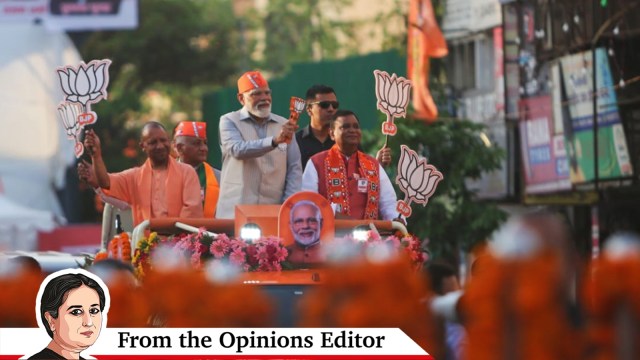
Dear Express reader
In the last major bout of assembly polls ahead of Lok Sabha elections, in November 2023, while the BJP ran an uber-centralised campaign in the states, with PM Narendra Modi, not its local leaders, in charge, Congress went hyper local when it was not simply counting on the BJP to defeat the BJP.
This was very much on show in Madhya Pradesh, for instance, the state I travelled to, to cover the campaign. In that state, the Congress’s local candidates were the stars of their own campaigns, there seemed no unifying spirit or theme — even the demand for a caste census, being raised by Rahul Gandhi nationally, found only a perfunctory mention, if at all, by Congress candidates and leaders locally.
It also seemed that the Congress going local was due to the fact that on the larger ideas and issues, at ground level, it had mostly plunged into a me-too race with the BJP — in shows of public Hindu religiosity, for instance, or on promises of cash transfers and subsidies.
In fact, with campaign billboards of both parties emblazoned with promises to benefit different sections of the electorate, here and now, in rupees, the space for larger and more long-term ideas seemed to be generally a casualty.
Now with Lok Sabha elections round the corner, however, there is a question: Can Congress afford to run a campaign that is decentralised, leaving it to the local chemistry and math, or me-too, or defined by promises of instant gratification to the voter?
Or will it recognise that the imperative of framing an alternative national agenda has been thrust upon it?
This is not just because a national, not an assembly election, is in the offing. It is primarily because with the arrest of two chief ministers ahead of the polls, one of whom is serving, and ED-CBI-IT action against political opponents, the BJP government has thrown down a larger gauntlet — it has left little room for dispersal or ambivalence or politics-as-usual for the principal Opposition party. The Congress manifesto that came out last week carries an acknowledgement of sorts that the onus of coherence is on it.
Of course, framing a response to a BJP that has declared a fight to the finish, one that is wearing its aggression on its sleeve and counting on impunity, will present its own set of challenges. To begin with, it will need Congress to make more of an effort to bridge the distance between Delhi and its local-level leaders and workers who have been going it alone, or playing it differently.
It must also find a language in which to speak to the people that is more vivid and empathetic — and not merely apocalyptic.
At the joint Opposition rally in Ramlila Maidan last Sunday, Congress and other parties framed the election itself as an issue in this election — they spoke of the level playing field, or rather its absence. But having framed it, these parties will need to connect it to the people so that it is not seen as the narrow and self-serving lament of the corrupt that the Modi-BJP is projecting it to be.
Inviting the two spouses of the two arrested chief ministers on-stage — Sunita Kejriwal and Kalpana Soren — was eye-catching. But for the message to strike home — of “democracy in danger” because of the BJP fighting dirty, or the BJP government’s alleged mis-use of power to target free expression and opposition in the name of corruption — it will need an ability to translate it into words and images that strike more sparks much more widely.
In a sense, all elections in a competitive and layered multi-party polity are hard-fought. In the end, they also carry the same deceptive assurance and promise — that the power of the people to vote out a government or vote another one in also means the power to enforce state responsiveness and accountability.
But some are more consequential than others. The BJP has just raised the stakes. Congress and Opposition will be watched for whether, or not, in the days and weeks to come, they can step up to it.